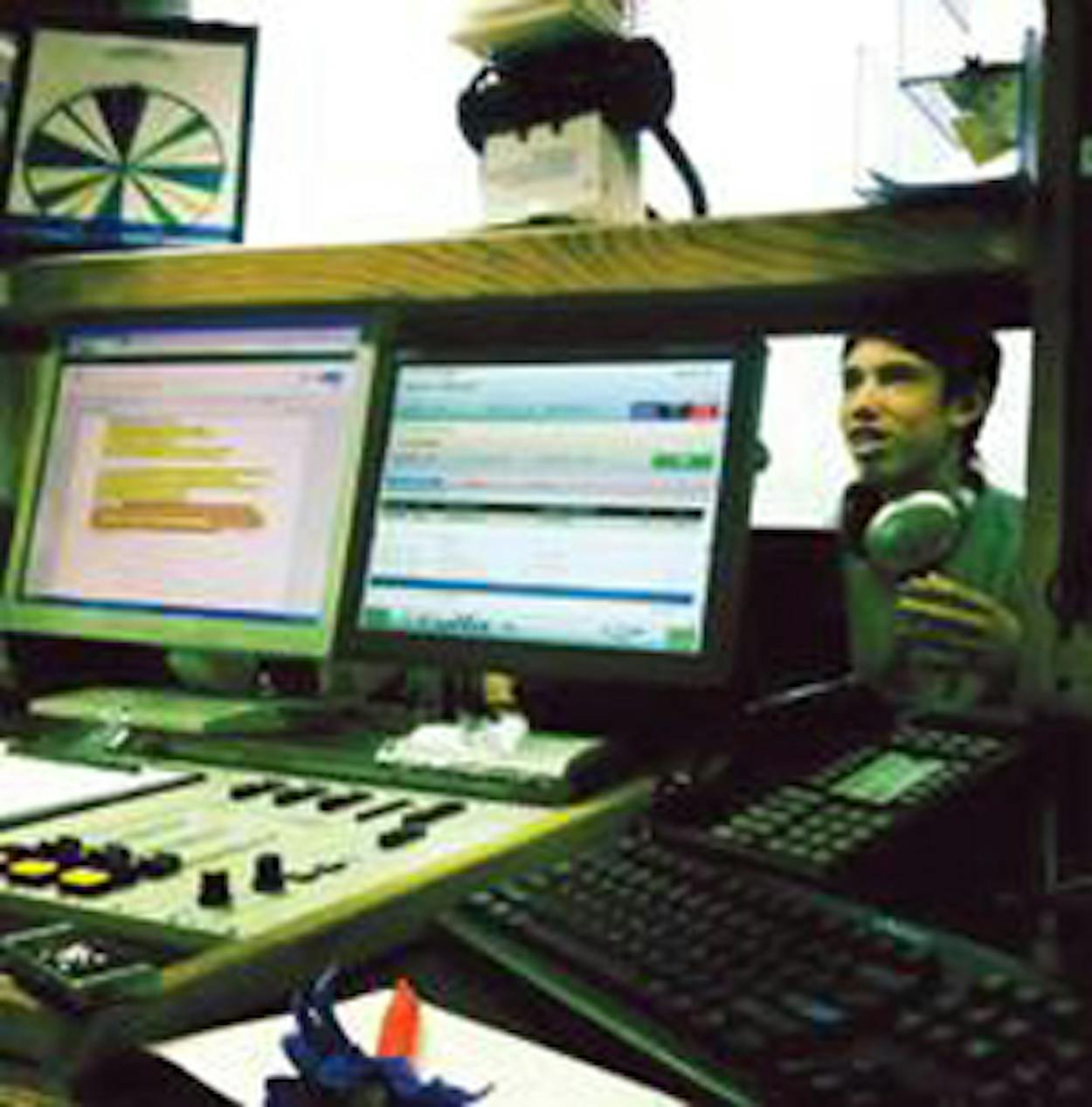 On a Tuesday morning in May, Riley Roberson and Jeremy Villanueva, both then juniors at Mesquite’s Horn High School, zipped down Town East Boulevard and parked in front of a nondescript brick building about ten miles from campus. Inside were the studios of KEOM, one of the few high-powered high school radio stations in the country, which broadcasts from a 61,000-watt tower behind Memorial Stadium. Around 250,000 tune in each month, and during school hours what they hear are Mesquite ISD students live-deejaying seventies hits, with a little sixties and eighties mixed in.
On a Tuesday morning in May, Riley Roberson and Jeremy Villanueva, both then juniors at Mesquite’s Horn High School, zipped down Town East Boulevard and parked in front of a nondescript brick building about ten miles from campus. Inside were the studios of KEOM, one of the few high-powered high school radio stations in the country, which broadcasts from a 61,000-watt tower behind Memorial Stadium. Around 250,000 tune in each month, and during school hours what they hear are Mesquite ISD students live-deejaying seventies hits, with a little sixties and eighties mixed in.
“We’ve been on KEOM for two years,” Jeremy said on the drive over, between sips of a Frappuccino. “At school we’re like, ‘Hey, we’re on the radio!’ Then they find out what kind of music we play. Uh, it’s definitely not hip-hop.”
“The gifted students, they think the radio thing is pretty cool,” Riley said. “Our grandparents do too.”
“Well, mine don’t,” Jeremy said. “ ’Cause it’s not tejano.”
Neil Diamond’s “Song Sung Blue” played as they walked down the maroonish-carpeted hallways, passing colorful bulletin boards. When they arrived at Mrs. Turner’s cubicle—the classroom, such as it is, for Advanced Broadcast Journalism—four students were huddled together, waiting to receive their morning assignments. Jeremy would tape a segment on a middle school librarian who hosted a Hunger Gamesmock-archery challenge, and Riley would continue to work on a “Wondrous Words” segment tracing the etymology of “hors d’oeuvre.” “They like us to use SAT words,” Alexa Everson, a senior, explained with a shrug.
“ ‘Hors d’oeuvre’ used to have to do with architecture,” Riley said. “Now it means, like, tiny sandwiches.”
KEOM began in 1984 as an elective, and it gained popularity in the early nineties, playing seventies songs that appealed to the deejays’ baby boomer parents. Parents are still KEOM’s biggest fans, posting requests to the station’s Facebook wall, though the station manager, Peggy Brooks, who’s been at KEOM since 1992, told me that the music grows on some of the students. “Jeremy knows all the lyrics,” she said, patting him on the back. “And a few are surprised to find that some current songs they like are not originals. They hear the originals here.”
Several minutes later, Jeremy (pictured) and Riley were sharing the main studio. The red “ON AIR” light dimmed, indicating that the two microphones were off. “They usually don’t let us on the air together,” Riley grinned, tinkering with the soundboard. “Giggling on air is a no-no. You can’t leave the listener out.” By the window, Jeremy frenetically rocked in his chair, singing along to Stevie Wonder’s “Isn’t She Lovely.”
Riley scanned the songs assigned to their shift, wondering if the hour’s play-list—which included Barbra Streisand’s “Woman in Love” right after the Captain and Tennille’s “Shop Around”—reflected the music manager Christopher Frazee’s love life. “They sometimes let us choose a song or two, but from a list,” Riley said. “I once accidentally played a Christmas song in February.”
“You said the wrong time once too!” Jeremy said. “That was dope!”
“I worried that old people took their diabetes medicine at the wrong time.”
“Hot mike!” Riley yelled. Jeremy snapped upright and intoned, “You’re listening to the best of community service programming and sounds of the sixties, seventies, and eighties on KEOM 88.5 FM.” Then he transitioned into a short recognition of a first-year teacher.
Lionel Richie’s “You Are” started playing. “We need to back-sell this song,” Riley said, meaning they had to say a few words about the song after it ended and before the traffic report.
For the next two minutes, Jeremy and Riley burrowed into Wikipedia, looking for something to say. “I have thirteen seconds before traffic. That’s a long time to talk,” Jeremy said, as he frantically clicked and typed on his computer.
“Twenty seconds, Jeremy,” Riley said.
Jeremy clicked open a Hot 100 chart from 1983.
“Ten seconds,” Riley said, and turned to the soundboard. With one second left, Riley yelled, “Hot mike!” then clicked it on and slid up the volume.
Jeremy approached the mike. “That was Lionel Richie’s ‘You Are,’ which peaked at number four in 1983 on Billboard Hot 100, here on 88.5 KEOM.”
Riley pushed the square button again, and the red light dimmed. “Man, I should have talked about his daughter,” Jeremy said, referring to the reality TV star Nicole Richie. He slumped back, deflated, and looked at Riley. “We need to get our own show next year.”








